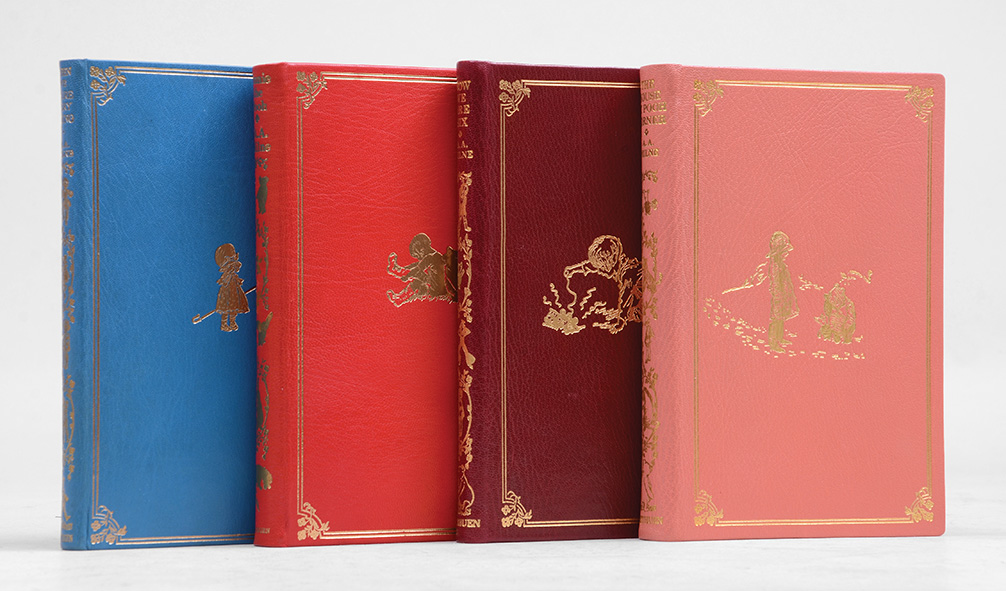
This Week in Dover Street: Christopher Robin, Nicholas Bentley’s political cats, and a useless piece of bibliomania from Philip Larkin.
Here at Peter Harrington Dover Street we like to showcase the very best in rare books, encompassing everything from the keenest heights of political economy to the most nostalgic depths of children’s literature. There really are some astounding things here and, since it would be a little selfish to keep them all to ourselves, we have decided to share a special selection of three exceptionally interesting items every week with the wider world. I hope you enjoy reading about these books from time to time – you can click through from the picture to the full entry on our website, where you can also browse our entire gallery and rare book stock. Additionally, if you find yourself in the area, please drop by 43 Dover Street and I’d be happy to show you around.
A complete set of Milne & Shepard’s Winnie the Pooh books, each copy signed by Christopher Robin – SOLD
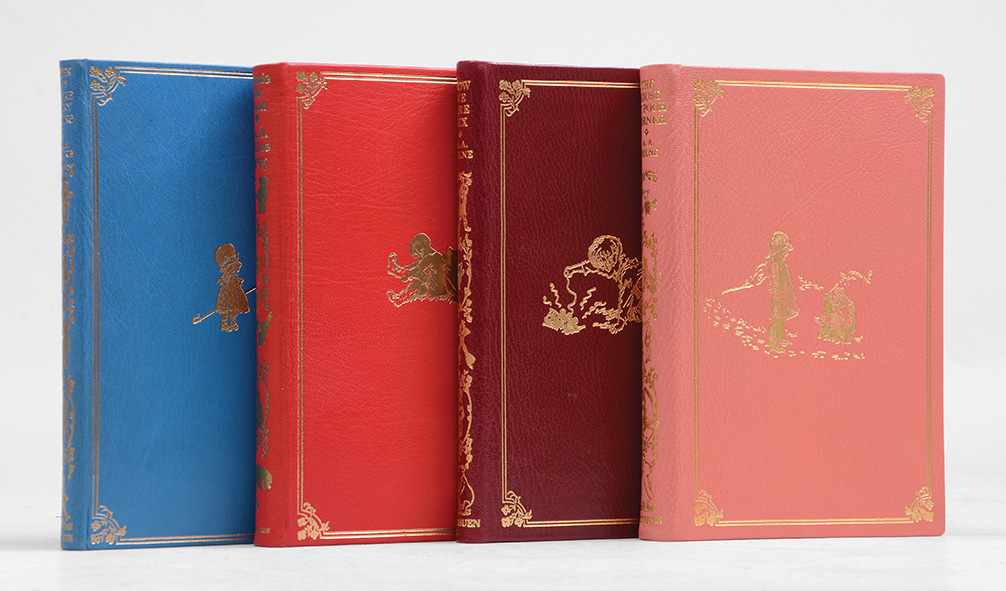
When We Were Very Young; Winnie-the-Pooh; Now We Are Six; The House at Pooh Corner.
As I mentioned before in my last blog about Huysmans’s A Rebours, one of the more exciting adventures of the rare book world is to be found when what had previously seemed pure fiction leaps into reality, in a readable (and indeed purchasable) form. If you’re a fan of A. A. Milne and E. H. Shepard’s much-loved quartet, comprised of two collections of nursery rhymes, When We Were Very Young (1924) and Now We Are Six (1927), alongside the two books Winnie the Pooh (1926) and The House at Pooh Corner (1928) relating the adventures of Pooh-bear, Piglet, Tigger, Rabbit, all their friends in the Hundred Acre Wood, and of course Christopher Robin, then all these characters might seem somehow real to you, as they do to me. After all, one of the great games of life is assigning to friends, family and colleagues their pertinent Hundred Acre Wood character.
Any observant person commuting to work in London will spot at least three Eeyores and a Rabbit. Kangas tend to work in HR. And so on.
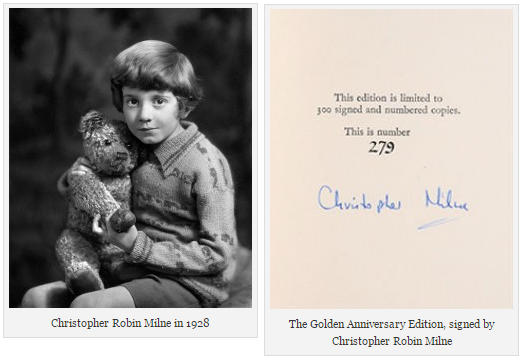
What you may not know is that Christopher Robin was a real person – he was based on Milne’s son, Christopher Robin Milne. He was hugely fond of his father and the books, that is, until he went to school and was brutally bullied. Later, as a soldier in the Second World War, he again found himself the target of general mockery, and became increasingly embarrassed and embittered by the hyper-nostalgic heritage that had been imposed on him by his father.
It is interesting, then, that in 1974, the year in which he published The Enchanted Places, part one of the autobiographical trilogy in which he revealed and analysed all the problems his father’s books had caused him, it was also the 50th anniversary of the first of them, When We Were Very Young. The publishers Methuen issued a special Golden Anniversary limited edition of 300 copies for each title, and asked Christopher Robin Milne to sign them. Strangely, wonderfully, he acquiesced, allowing us to present to the world this superb complete set of the Golden Anniversary edition, each copy signed by Christopher Robin himself.
“This useless piece of bibliomania” – Larkin’s poem Aubade inscribed to John Wain – SOLD
Philip Larkin is usually considered a “depressing” poet, and this is no misconception. His poem Aubade, a 4am moody meditation on death, is perhaps his most notoriously unforgiving:
“Most things may never happen: this one will,
And realisation of it rages out
In furnace-fear when we are caught without
People of drink. Courage is no good:
It means not scaring others. Being brave
Lets no one off the grave.
Death is no different whined at than withstood.”
Pretty grim. It must be said that Larkin’s poetry does have rare flashes of light and warmth that are all the more valuably real for flaring up in such a gloomy atmosphere. That side of him, however, does not appear in Aubade; the whole thing is 50 lines of cold shudder.
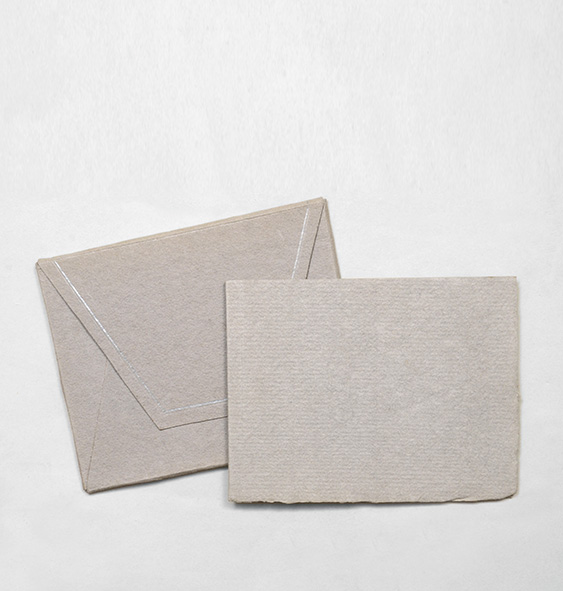
The first printing.
The poem was first separately printed in 1980, using an inconspicuous, suitably grey, envelope format (suggestive of the poem’s closing line – “postmen go like doctors from house to house”), in a small signed limited edition of 250 copies. This copy, however, has more to it. Open the flap, remove the booklet, turn to the first page, and you encounter Larkin’s inscription to fellow poet John Wain:
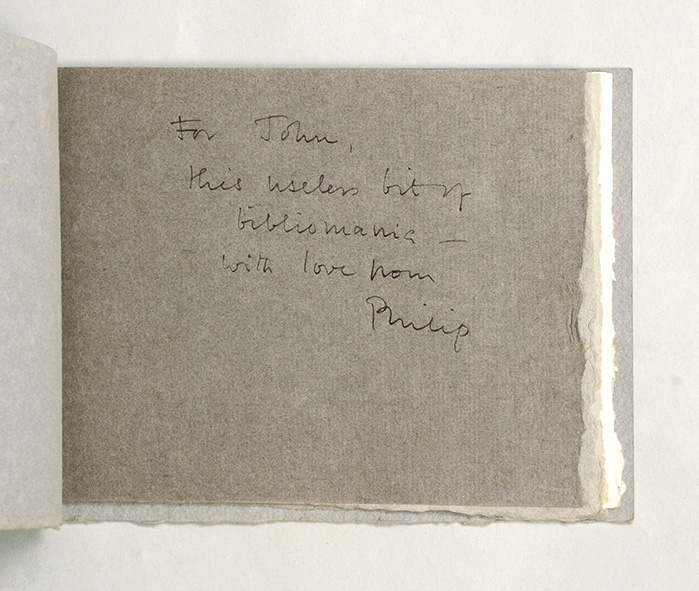
“For John, this useless bit of bibliomania – with love from Philip”
“For John, this useless bit of bibliomania – with love from Philip”.
A superb association, sure, but still… This useless bit of bibliomania.
So Philip Larkin frowns darkly upon my way of life, and there’s another cold shudder.
Conservatives love cats – Nicholas Bentley spoofs the General Election – SOLD
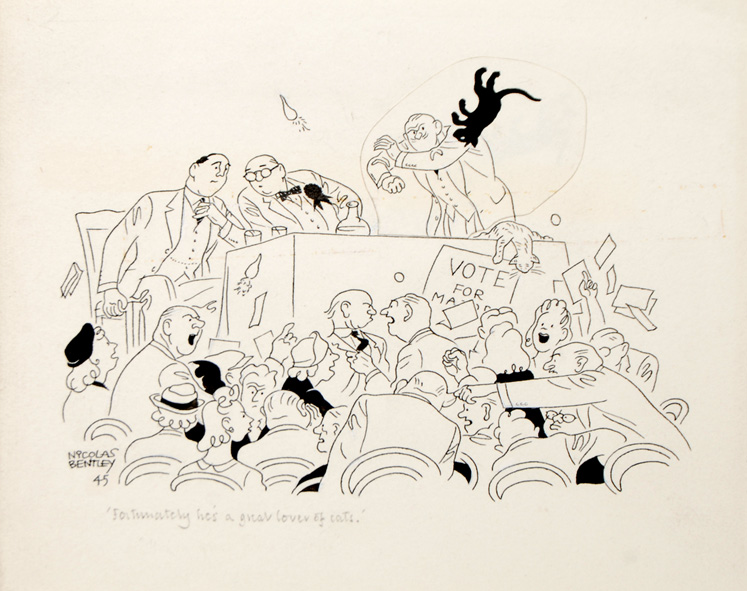
“Fortunately he’s a great lover of cats.”
Here is a superb early piece of political satire by Nicholas Bentley, an original drawing from our excellent archive of his work (all available for browsing here, or in store at 43 Dover Street) through which, over three decades of newspaper cartoons appearing in the Daily Mail and Sunday Telegraph, he observed British popular and political culture with waspish yet amused urbanity.
Here he find him spoofing a riotous hustings from the General Election of 1945 (70 years ago, in which the Conservatives were beaten by a landslide), with the Conservative candidate (conceivably a caricature of Major-General Sir Edward Spears) defiantly batting away another projectile feline.
The chairman of the debate leans over to the nervous opposing candidate, reassuring him of his opponent’s great compassion, at least when it comes to cats. Comparing this uproarious scene to the Election Debates of today makes one almost weep that things could have come to such an anodyne (albeit more animal-friendly) pass.

Recent Comments